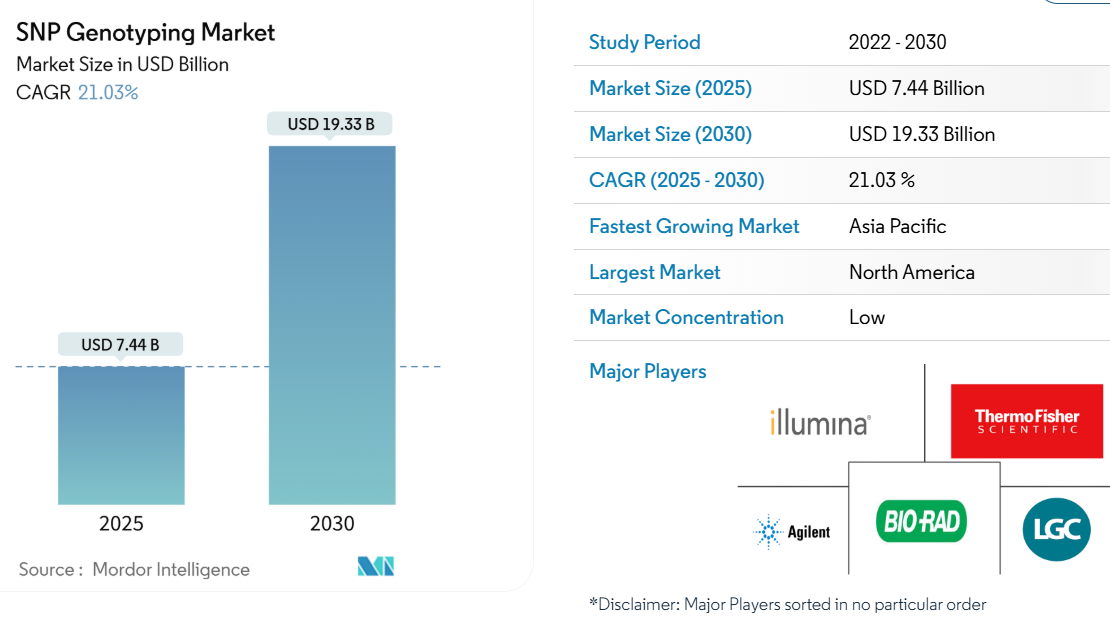Mordor Intelligence has published a new report on the SNP Genotyping Market, offering a comprehensive analysis of trends, growth drivers, and future projections.
The Single Nucleotide Polymorphism (SNP) genotyping market is projected to expand from USD 7.44 billion in 2025 to USD 19.33 billion by 2030, reflecting a robust compound annual growth rate (CAGR) of 21.03%. This significant growth is propelled by technological advancements, increased applications in personalized medicine, and strategic initiatives by key industry players.
Introduction
SNP genotyping involves analyzing genetic variations at single nucleotide positions in the genome, playing a crucial role in understanding genetic predispositions to diseases and individual responses to therapies. The rising prevalence of chronic and genetic disorders has heightened the demand for precise diagnostic tools, positioning SNP genotyping as a cornerstone in personalized medicine. Technological innovations have enhanced the accuracy, efficiency, and accessibility of genotyping methods, further fueling market expansion.
Key Trends
-
Technological Advancements: The miniaturization of equipment and the development of high-throughput platforms have revolutionized SNP genotyping. Innovations such as microarrays and next-generation sequencing (NGS) have significantly increased the speed and accuracy of genotyping processes, enabling large-scale studies and comprehensive genetic analyses.
-
Rising Prevalence of Genetic Disorders: The increasing incidence of genetic and chronic diseases has underscored the need for advanced diagnostic tools. SNP genotyping facilitates the identification of genetic markers associated with various conditions, aiding in early detection and personalized treatment strategies.
-
Strategic Industry Initiatives: Leading companies are actively investing in research and development to introduce novel products and expand their market presence. Collaborations, mergers, and acquisitions are prevalent strategies aimed at enhancing technological capabilities and product portfolios, thereby driving market growth.
Market Segmentation
The SNP genotyping market is segmented based on technology, application, and geography:
-
By Technology:
-
TaqMan SNP Genotyping: Utilizes fluorescent probes for allele discrimination, known for its specificity and sensitivity.
-
MassARRAY SNP Genotyping: Employs mass spectrometry for high-throughput genotyping, suitable for large-scale studies.
-
SNP GeneChip Arrays: Microarray-based technology enabling simultaneous analysis of thousands of SNPs.
-
Other Techniques: Includes methods like sequencing and PCR-based assays.
-
-
By Application:
-
Pharmacogenomics: Application in drug development and personalized medicine to understand genetic factors influencing drug response.
-
Diagnostic Field: Utilized in identifying genetic markers associated with diseases, aiding in diagnostics and prognostics.
-
-
By Geography:
-
North America: Leading market with advanced healthcare infrastructure and significant research activities.
-
Europe: Growing emphasis on personalized medicine and supportive regulatory frameworks.
-
Asia-Pacific: Fastest-growing region due to increasing healthcare investments and rising awareness of genetic testing.
-
Middle-East and Africa: Emerging market with gradual adoption of advanced genetic technologies.
-
South America: Developing market with potential growth opportunities in the healthcare sector.
-
Get a Customized Report Tailored to Your Requirements. – https://www.mordorintelligence.com/market-analysis/genetic-engineering
Key Players
Prominent companies in the SNP genotyping market include:
-
Thermo Fisher Scientific Inc.: Offers a comprehensive range of genotyping solutions with a focus on innovation and quality.
-
Agilent Technologies: Provides advanced analytical instruments and genotyping platforms catering to diverse research needs.
-
Bio-Rad Laboratories Inc.: Specializes in life science research and clinical diagnostics, offering robust genotyping tools.
-
Illumina Inc.: A leader in sequencing and array-based technologies, delivering high-throughput genotyping solutions.
-
LGC Group: Focuses on genomics and analytical testing, offering a suite of genotyping services and products.
Conclusion
The SNP genotyping market is poised for substantial growth, driven by technological advancements and the increasing demand for personalized medicine. As the understanding of genetic variations deepens, the application of SNP genotyping is set to expand across various domains, including disease diagnostics, pharmacogenomics, and agricultural research. Strategic collaborations and continuous innovation will be pivotal in navigating the evolving landscape and addressing the growing needs of precision medicine.
Industry Related Reports

